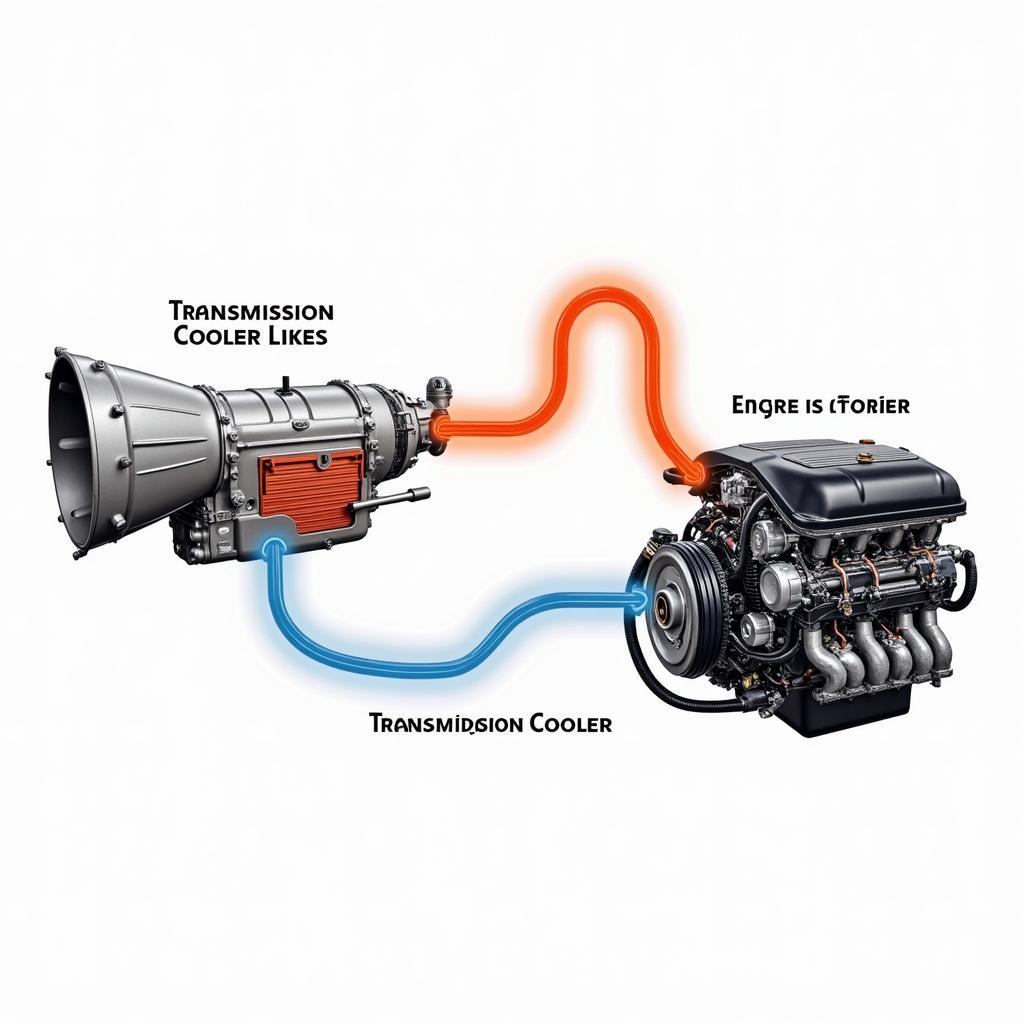Can Transmission Problems Cause Car Overheat? Absolutely. While seemingly separate systems, your car’s transmission and cooling system are more intertwined than you might think. A malfunctioning transmission can indeed contribute to overheating, and vice versa. Understanding this connection is crucial for proper car maintenance and avoiding costly repairs. Let’s delve into the specifics.
 Transmission and Engine Overheating Connection
Transmission and Engine Overheating Connection
How Transmission Issues Lead to Overheating
Several transmission problems can trigger or exacerbate overheating. A failing torque converter, for instance, can generate excessive heat, stressing the cooling system. Low transmission fluid levels, due to leaks or neglect, reduce the fluid’s ability to dissipate heat effectively. This can lead to overheating within the transmission itself, and that heat can radiate to the engine, compounding the issue. Clogged transmission coolers restrict fluid flow, further hindering heat dissipation and increasing the risk of overheating. Think of it like a clogged artery – it restricts flow and causes pressure to build. Similarly, a restricted transmission cooler can’t efficiently cool the transmission fluid, leading to overheating.
“A common misconception is that transmission issues are isolated,” says automotive expert, Robert Miller, ASE Certified Master Technician. “The reality is, different systems in your car are interconnected, and a problem in one area can often affect others.”
insurance coverage for car problems
Identifying the Culprit: Transmission or Engine?
Distinguishing between transmission-related overheating and a primary engine cooling system problem is crucial for effective troubleshooting. If you notice the temperature gauge rising especially during stop-and-go driving or when towing, a transmission problem might be a contributing factor. Check the transmission fluid level and condition. If it’s low or smells burnt, it’s a red flag. Overheating coupled with slipping gears or rough shifting further points towards a transmission issue.
What are the signs of transmission overheating?
Signs of transmission overheating include a burning smell, slipping gears, difficulty shifting, and overheating of the engine.
Preventing Transmission-Related Overheating
Regular maintenance is key. Ensure your transmission fluid is changed at the recommended intervals specified in your owner’s manual. This helps maintain the fluid’s cooling and lubricating properties. Inspecting for leaks and addressing them promptly prevents fluid loss and subsequent overheating. Keeping the cooling system in top shape, including flushing the coolant regularly, ensures it can effectively handle the heat generated by the engine and the transmission.
How often should I change my transmission fluid?
Refer to your owner’s manual for specific recommendations, but generally, every 30,000 to 60,000 miles is a good guideline.
What if My Car is Already Overheating?
If your car is overheating, pull over safely as soon as possible. Continuing to drive can cause serious engine damage. Do not attempt to remove the radiator cap while the engine is hot, as you risk severe burns. Allow the engine to cool down completely before checking the coolant level. If you suspect a transmission issue, have the vehicle towed to a qualified mechanic for diagnosis and repair.
“Preventive maintenance is always cheaper than major repairs,” advises Sarah Chen, Mechanical Engineer specializing in automotive transmission systems. “Regularly checking your fluids and addressing any issues promptly can save you a lot of headaches down the road.”
Can a transmission problem cause a car to overheat when idling?
While less common than during driving, a severely malfunctioning torque converter can generate excessive heat even at idle, potentially contributing to overheating.
Conclusion
Can transmission problems cause car overheat? The answer is a resounding yes. While the cooling system is primarily responsible for regulating engine temperature, a malfunctioning transmission can significantly contribute to overheating. Regular maintenance, prompt attention to leaks, and addressing transmission issues quickly are crucial for preventing this problem and ensuring the longevity of your vehicle. If you have any concerns about your car’s cooling system or transmission, don’t hesitate to connect with us at AutoTipPro for expert advice and assistance. You can reach us at +1 (641) 206-8880 or visit our office at 500 N St Mary’s St, San Antonio, TX 78205, United States.
insurance coverage for car problems
FAQ
-
Can low transmission fluid cause overheating? Yes, low transmission fluid reduces the fluid’s ability to dissipate heat, leading to overheating.
-
What are the signs of a bad torque converter? Symptoms include overheating, slipping gears, and a shuddering feeling when accelerating.
-
How can I tell if my transmission cooler is clogged? A clogged cooler can lead to overheating and reduced transmission performance. A mechanic can diagnose this issue.
-
Is it safe to drive with an overheating car? No, it is not safe. Stop driving immediately and allow the engine to cool down.
-
How often should I check my transmission fluid? It’s a good practice to check your transmission fluid at least once a month.
-
Can transmission problems cause car overheat even in cold weather? Yes, transmission problems can cause overheating regardless of the outside temperature.
-
What should I do if my car overheats while driving? Pull over safely, turn off the engine, and let it cool down before checking the coolant level.




Leave a Reply